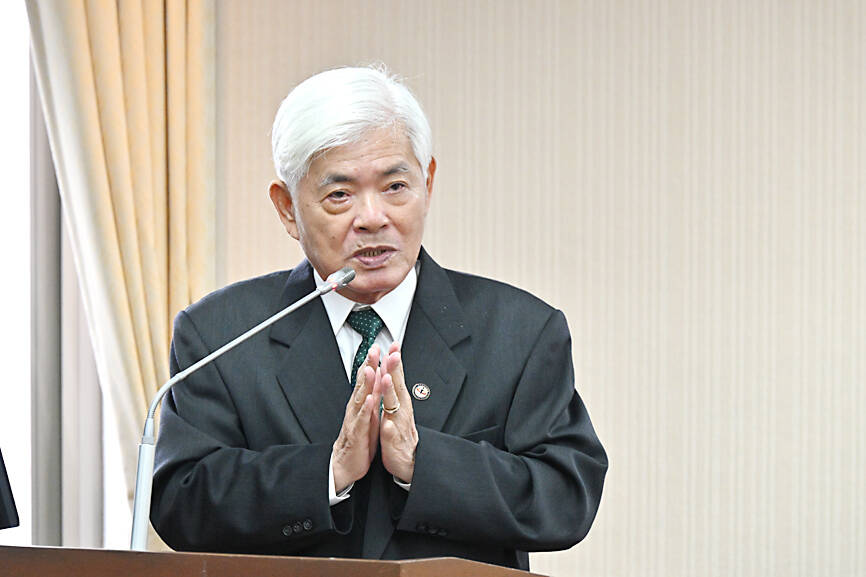A draft amendment proposing that an elected official can only be recalled if the number of recall votes exceeds the number of votes with which they were originally elected is based on a questionable argument, the Central Election Commission (CEC) said yesterday, adding that Taiwan would become the only country with such a recall system if it is passed.
The legislature’s Internal Administration Committee yesterday reviewed draft amendments to the Public Officials Election and Recall Act (公職人員選舉罷免法), including one motioned by Chinese Nationalist Party (KMT) Legislator Hsu Yu-chen (許宇甄) to increase the threshold for passage.
This proposal would make it difficult, but not impossible for elected officials to be recalled, Democratic Progressive Party (DPP) Legislator Tsai Yi-yu (蔡易餘) said, citing the example of former Kaohsiung mayor Han Kuo-yu (韓國瑜), who was recalled with 939,090 votes after being elected as major with 892,545 votes.

Photo: George Tsorng, Taipei Times
However, none of the other recall elections held in recent years had a voting rate greater than that of their regular election counterparts, he said, adding that the threshold proposed by Hsu would make future recalls unlikely to succeed
No threshold was set in the act on recall voting rates, and the legal force of a recall vote should not be invalidated because of a low turnout, CEC Chairman Lee Chin-yung (李進勇) said.
The votes an official received in their election should not be used as a benchmark for the votes necessary to recall them, as some people who voted them into the post might change their mind and vote to recall them, Lee said.
The current recall mechanism is deficient due to the low passage thresholds for the petition and the recall election, making it easily abused for political means, Hsu said.
Polls have shown that more than half of the public are opposed to allowing the minority to invalidate the majority, and they agreed with the amendment, Hsu said.
Lee said that Hsu’s phrasing of “the minority invalidating the majority” oversimplified the problem, as turnouts, voting rates and numbers of candidates differ between recalls and elections.
The problem does exist and can be discussed, but comparing recall votes with original votes is an unsuitable solution, he said.
Meanwhile, DPP lawmakers quarreled with KMT Legislator Hsu Hsin-ying (徐欣瑩), who hosted the committee meeting and reduced the speaking time for each legislator, saying that there were too many speakers.
She muted the microphone when some DPP lawmakers were speaking, causing complaints from the DPP caucus.

Taiwan has received more than US$70 million in royalties as of the end of last year from developing the F-16V jet as countries worldwide purchase or upgrade to this popular model, government and military officials said on Saturday. Taiwan funded the development of the F-16V jet and ended up the sole investor as other countries withdrew from the program. Now the F-16V is increasingly popular and countries must pay Taiwan a percentage in royalties when they purchase new F-16V aircraft or upgrade older F-16 models. The next five years are expected to be the peak for these royalties, with Taiwan potentially earning

STAY IN YOUR LANE: As the US and Israel attack Iran, the ministry has warned China not to overstep by including Taiwanese citizens in its evacuation orders The Ministry of Foreign Affairs (MOFA) yesterday rebuked a statement by China’s embassy in Israel that it would evacuate Taiwanese holders of Chinese travel documents from Israel amid the latter’s escalating conflict with Iran. Tensions have risen across the Middle East in the wake of US and Israeli airstrikes on Iran beginning Saturday. China subsequently issued an evacuation notice for its citizens. In a news release, the Chinese embassy in Israel said holders of “Taiwan compatriot permits (台胞證)” issued to Taiwanese nationals by Chinese authorities for travel to China — could register for evacuation to Egypt. In Taipei, the ministry yesterday said Taiwan

‘LIKE-MINDED PARTNER’: Tako van Popta said it would be inappropriate to delay signing the deal with Taiwan because of China, adding he would promote the issue Canadian senators have stressed Taiwan’s importance for international trade and expressed enthusiasm for ensuring the Taiwan-Canada trade cooperation framework agreement is implemented this year. Representative to Canada Harry Tseng (曾厚仁) in an interview with the Central News Agency (CNA) said he was increasingly uneasy about Ottawa’s delays in signing the agreement, especially as Ottawa has warmed toward Beijing. There are “no negotiations left. Not only [is it] initialed, we have three versions of the text ready: English, French and Mandarin,” Tseng said. “That tells you how close we are to the final signature.” Tseng said that he hoped Canadian Prime Minister Mark Carney

POSITIVE DEVELOPMENT: Japan and the US are expected to hold in-depth discussions on Taiwan-related issues during the meeting next month, Japanese sources said The holding of a Japan-US leaders’ meeting ahead of US President Donald Trump’s visit to China is positive news for Taiwan, former Japan-Taiwan Exchange Association representative Hiroyasu Izumi said yesterday. After the Liberal Democratic Party’s landslide victory in Japan’s House of Representatives election, Japanese Prime Minister Sanae Takaichi is scheduled to visit the US next month, where she is to meet with Trump ahead of the US president’s planned visit to China from March 31 to April 2 for a meeting with Chinese President Xi Jinping (習近平). Japan and the US are expected to hold in-depth discussions on Taiwan-related issues during the